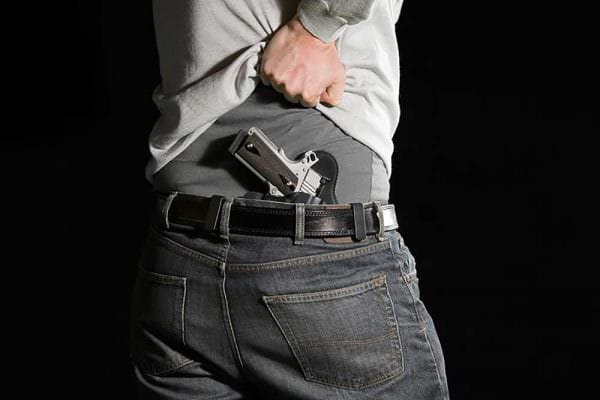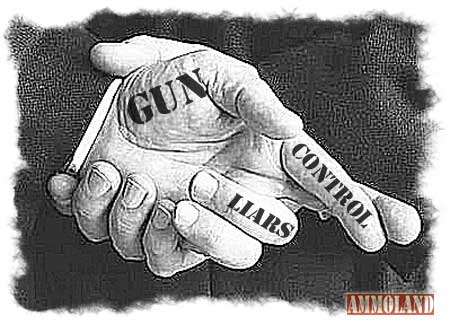
New Jersey – -(AmmoLand.com)- Two years ago I was a moderately anti-gun liberal living in one of the bluest states in the country, going on my first trip to the range with a friend to rent and shoot. Last year I became a liberal first-time gun owner, and this year I’m starting to fight against my party in New Jersey to gain access to my constitutional right to carry a firearm.
So what exactly happened?
Well, a worldwide pandemic causing a spike in crime around my home sure has a way of changing one’s perspective. As the police got stretched thin and for the grocery stores went bare I observed the following in the past year:
- A murder occurred at a motel within a mile of my home.
- Robberies at retail locations were up stretching the local police thinner than they already were.
- Various shopping centers we regularly frequented now had people aggressively accosting others for money, and getting threatening when refused. This happened to me.
- My neighbors found a homeless encampment in the small patch of woods behind our homes. The cops cleared the camp but didn’t catch the people living there. It would have been trivial for anyone living there to get through our back fence and attempt to break-in.
- Two people were held at gunpoint at an ATM at the bank I use around the corner from my house.
You might think that I live in a particularly dangerous area of the state, but I actually live in what Money Magazine called one of the best places to live in the US in 2020.
If you look at the overall stats my town doesn’t seem particularly unsafe, but the pandemic has seen crime go up everywhere. The lesson I learned from this is that you never know when you might be in a situation to defend your life – no matter where you live.
One thing you’ll notice is that a variety of the events listed present a danger outside of my home, where I would want to be carrying my firearm in order to protect myself and my family.
New Jersey is technically a may-issue state for concealed carry permits, but in reality, is a de-facto “no issue” state.

If you are not already politically connected or have enough money and the knowledge of who to donate to, “personal protection” is not a “good reason” to carry a handgun where I live. This is a right people who live as little as 20 minutes away in Pennsylvania are guaranteed if they pass a background check (PA is a “shall-issue” state).
What makes my situation infuriating is that I’m told by anti-gun activists and politicians in my state that the de-facto ban on concealed carry is there to “keep you safe”. This is a demonstrable lie.
I’ve changed political opinions on various issues in dramatic ways over the course of my life, and the surest way for that to happen is for me to catch “my side” lying or acting hypocritically. When it came to gun issues, I found that the data does not support the gun control laws being proposed. There is no issue where this is clearer than when it comes to concealed carry laws.
The Data
Since the 1980s, the overwhelming majority of states have loosened up their gun laws over time, going from “may-issue” states that can subjectively deny an applicant for any reason, or no-issue states to either permitless carry or “shall-issue” where anyone who passes a background check and/or some proficiency testing must be issued a concealed carry permit.
Because this has happened over such a long period of time, we have a lot of data we can look at to see if the opening up of concealed carry laws has had any effect on making states more or less safe.
The answer is unequivocal NO! Loosening up of concealed carry laws has no discernable impact on a state’s homicide rate.
Let’s look at an example to show how we arrive at this conclusion:
Florida was one of the first states to allow concealed carry, becoming “shall-issue” in 1987. In 1987 the murder rate in Florida was 11.4, in 2019 (the latest year we have data for from the FBI), it was 5.2.
Does this mean that looser concealed carry laws caused the murder rate to drop? No, but it does mean that looser concealed carry laws didn’t cause the murder rate to increase.
Murder rates, like almost all violent crime rates, have dropped dramatically over the last 30 years. If we take an exhaustive look at the data we will find that there is no correlation between loose concealed carry laws and a state’s murder rate.
Here is the spreadsheet showing murder rates from 1999 to 2019, the data most readily available from the FBI’s website (2019 is the latest year they have published as of this writing).

There are a few key pieces of data we can observe for the latest year we have on record (2019):
The state with the lowest murder rate in the country (Maine, 1.5) has permitless carry, whereas the state with the highest murder rate (Louisiana, 11.7) is a shall-issue state.
If we look at the 10 states with the lowest murder rates we will find:
- 5 of them have permitless carry (ME, VT, SD, ID, WY)
- 4 were “shall issue” (IA, MN, UT, NE)
- 1 is “may-issue” where it’s a de facto ban on concealed carry (MA).
If we look at the 10 states with the highest murder rates we will find:
- 4 have permitless carry (MS, AK, MO, AR)
- 5 were “shall issue” (LA, SC, NM, TN, OK)
- 1 is “may-issue” where it’s a de facto ban on concealed carry (MD).
This alone should be enough to show there is no correlation between carry laws and safety. We have roughly the same distribution of carry laws in our safest and most dangerous states, if anything the safer states are slightly more permissive than the more dangerous ones, not less.
Population and Density
At this point gun control advocates might try to argue that population and density are important factors that aren’t captured by this data, meaning more populous or more densely populated areas have reasons to enact stricter gun control and effectively ban concealed carry.
This is false, the data proves otherwise:
Louisiana had the highest murder rate per capita in the country at 11.7. It is a shall-issue state, it has 4.6 million people and a population density of 107.5 people per square mile of landmass.
Wisconsin is a shall-issue state, it has 5.8 million people and a population density of 107.6, but it had a murder rate of only 3.0.
This should be enough to show that things like carry laws, population, and density don’t really have a causal relationship with a state’s murder rate, but I want to make things more explicit about how restrictive carry laws don’t make a state any safer.
New Jersey can be hard to compare to other states because it is the most densely populated state in the nation with 1,207 people per square mile and a population of 8.9 million. We have a de-facto ban on concealed carry as a “may issue” state and a murder rate of 2.9.
However, we can see that a state with a roughly similar population like Washington with 7.7 million people has a lower murder rate than we do at only 2.5; however, WA is a “shall issue” state.
But what about population density? We can compare NJ to the next most densely populated state Rhode Island which has a population density of 1,022 people per square mile, but it also had a lower murder rate than we do at only 2.4. Rhode Island actually has permitless carry, which they passed in February 2017 when the murder rate dropped down to 1.9.
The Truth About Concealed Carry and Murder Rates

The plain fact of the matter is that there is no correlation between how permissive a state is with concealed carry vs. that state’s murder rate.
The most apples-to-apples comparison we can make in the data is to look at what the murder rates look like in states that loosened them up to allow concealed carry.
If you look at these last 20 years, in every state that went less restrictive on concealed carry we can see that after loosening up the laws they’ve had some years with lower murder rates than when they had more restrictive carry laws. Those same states have had instances where the murder rate went up some years after loosening up. There simply is no correlation, and if there is no correlation then the law doesn’t actually have an effect on the relevant statistics.
The conclusion is clear: Concealed carry restrictions do not make us safer. All it does is prevent honest citizens from being able to defend themselves and their families in public.
“Why Don’t You Just Move” and the Chances of Reform
With so many states allowing concealed carry, not to mention not requiring overly burdensome regulations to purchase a firearm, why not just leave the state? There are two reasons why I don’t want to move.
- This is my home! My family moved here when I was only 11 years old. I grew up here, went to college here, and have established a 20-year long career here. More importantly, this is where my friends and family all live; I can get to my job within 10 minutes, my friends are even closer. My kids love their school which does a great job educating them.
- Carrying is my constitutional right! The Constitution says that the right to bear arms shall not be infringed. If you look up the definition of what it means “to bear” it means “to carry”, even back in the days the constitution was written. Hopefully in the next few months, we will find out if the Supreme Court will finally adjudicate the split decisions at the federal court level as to how this right is to be interpreted.
Gun control isn’t the only hot-button issue where the dominant political party in a state doesn’t like a constitutionally guaranteed right. In red states, they don’t like the fact that women have the right to have an abortion (a right I wholly support), and so they continually enact restrictions and mandatory regulations so as to make it as hard as they can to get an abortion.
Should we tell the women in those states to “just move” if they want abortions? No, we challenge those laws in court in order to peacefully overturn unconstitutional violations of our rights, which is what happens most of the time with such laws.
Currently, the Supreme Court is considering whether or not to grant cert to NYSRPA v Corlett, which would finally settle the matter once and for all. With the new composition of the SCOTUS, us gun owners are hoping that they will finally start taking second amendment cases again and overturn these unconstitutional violations of our rights.
I hope that if the court does take that case and rules in our favor, that at least this article will show that we have nothing to fear from ordinary citizens being able to concealed carry.
How the Gun Control Lobby Lies To You

All the data I’m presenting here is publicly available from the FBI’s website (ucr.fbi.gov/crime-in-the-u.s/), I just couldn’t find it collated in a way that showcases state by state over time, overlaid as to what each state’s concealed carry laws were at that time. I also want to cover what I’m presenting and why so as to contrast that with the intentionally distorted numbers gun control advocates like to present.
What I’m presenting is each state’s homicide rate per capita: ie. how many people were murdered per 100,000 people that state has in their population. This actually is less favorable to my position because not all homicides involve a gun. However, homicide rates are more consistently presented and collected by the FBI over time whereas homicides that involve a firearm are noted by the FBI as being necessarily incomplete for a few states.
Still, if a change in the concealed carry laws caused an increase in murders, it would necessarily be reflected with an increase in a state’s homicide rate.
If you contrast this with the sort of data presented by gun control advocates you’ll often find states listed by “gun deaths” which lumps suicides with murders so as to inflate the numbers per state. This is because gun suicides make up roughly two-thirds of all “gun deaths” in the country, whereas gun homicides are roughly the last third.
The problem with this is that the question “does allowing concealed carry make us more or less safe?” is not answered by looking at suicides. The fear is that having more people carrying a concealed gun in public will result in more murders.
I’m no less safe if it turns out that people committing suicide in a state tend to use more guns to do it, and the ability to concealed carry isn’t going to cause someone to commit suicide.
What suicide numbers does do is muddy the waters when comparing states and policies. New Jersey for instance has a very low suicide rate in general (not just gun suicides), but it has a comparatively higher murder rate; by mixing the data sets the gun control lobby can make NJ look safer than it actually is.
The question you should ask yourself is why advocacy groups present distorted data, and what does that tell you.
~ John Lopilato, New Jersey.
